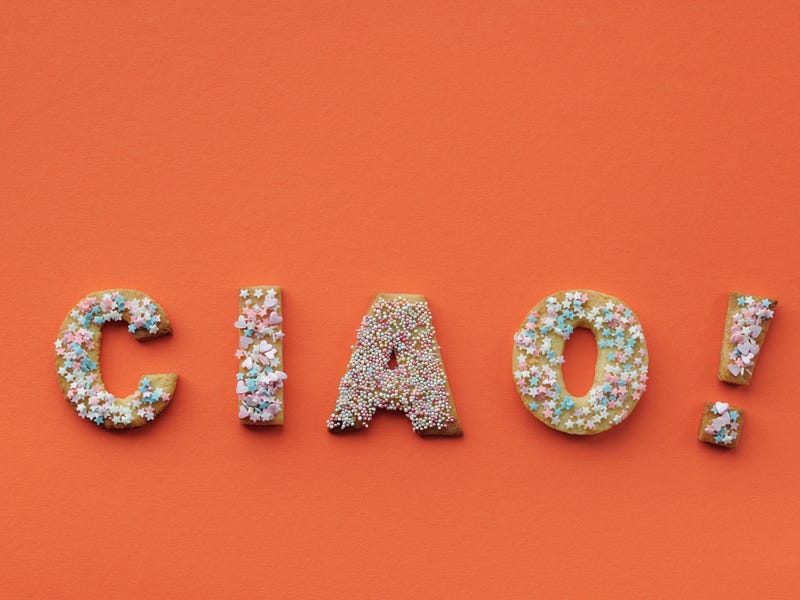
100+ Colorful and funny Italian phrases, words and facts you'll love to use
Author: Jessica Maggi
Pop quiz! Which Italian word in each of these pairs is funnier: bacherozzolo or acquerugiola? Pennichella or bazzecola? Ninnolo or fannullone
These words have the ability to make otherwise mature individuals laugh, because they just sound absolutely hilarious. The Italian language certainly has its fair share of fun-to-say words and sayings.
In this article, we’ll also introduce you to paccottiglia, barattolo, tapparella, and other funny Italian words, phrases and expressions to spice up your conversations.
Let’s get right into it!
Take a break from your Italian lessons and try our LOL Italian quiz!
Funny Italian vocab and sayings
Sometimes what we learn from textbooks is just not enough. Speaking real Italian means using certain words, amusing expressions, abbreviations, colorful idioms, and funny Italian phrases that you’ll only learn in bars with friends, on the street, or in this article.
In addition to mastering essential vocabulary, it’s important that you learn these fun words and commonly-used expressions to fully understand what is being said to you and around you.
Let’s get going!

Funny Italian phrases, idioms and things to say in Italian
Part of our everyday life, Italian idioms can be hilarious. They reflect cultural customs, values, and traditions, and rely massively on metaphors and analogies. That’s why they often seem totally random when translated literally.
The key to understanding funny Italian sayings, idioms, and amusing expressions is never to read them in a literal sense, as most of the time they have very different meanings from their literal translations. Try and figure out what they mean, instead.
Enjoy the lighter side of the Italian language with these colorful idioms, the secret to sounding like a native speaker.
| Italian | IPA | Pronunciation | Literal meaning | Actual meaning |
|---|---|---|---|---|
| Far vedere i sorci verdi | [fˈarvedˈereˈisˈort͡ʃɪvˈerdɪ] | fahr veh-deh-reh ee sohr-chee vehr-dee | To make someone see green rats | To give someone trouble |
| Essere fuori come un balcone | [ˈɛs͡serefʊˈorɪkˈomeˈunbalkˈone] | eh-seh-reh phoo-oh-ree koh-meh oon bahl-koh-neh | To be out as a balcony | To be loopy |
| Salvare capra e cavoli | [salvˈarekˈapraˈeːkˈavolɪ] | sahl-vah-reh kah-prah eh kah-voh-lee | To save goat and cabbages | To find a solution to a tricky situation without compromising any positive outcome |
| Mettere la pulce nell’orecchio | [mˈetːerelˈapˈult͡ʃenˈɛl’orˈekːio] | meh-teh-reh lah pool-che nehl oh-reh-kee-oh | To put a flea in someone’s ear | To arouse someone’s doubts or suspicions |
| Tirarsi la zappa sui piedi | [tirˈarsɪlˈad͡zˈapːasˈuipjˈedɪ] | tee-rahr-see lah tsah-pah soo-ee pee-eh-dee | To throw the hoe on your own feet | To damage your own plans or progress through silly actions |
| Conoscere i propri polli | [konˈoʃereˈiprˈɔprɪpˈollɪ] | koh-noh-sheh-reh ee proh-pree pohl-lee | To know one’s own chickens | To know someone so well that you can easily predict how they will behave in any given situation |
| Dare perle ai porci | [dˈarepˈɛrleˈajpˈɔrt͡ʃɪ] | dah-reh pehr-leh ah-ee pohr-chee | To give pearls to pigs | To give valuables to people unable to appreciate them |
| Rigirare la frittata | [rid͡ʒirˈarelˈafritːˈata] | ree-jee-rah-reh lah phree-tah-tah | To turn the omelet | To turn the tables in one’s favor |
| Fare d’una mosca un elefante | [fˈared̪ˈiː’ˈunamˈoskaˈunelefˈante] | fah-reh doo-nah mohs-kah oon eh-leh-phan-teh | To make an elephant out of a fly | To greatly exaggerate the importance of a problem |
| Essere suonato come una campana | [ˈɛs͡seresʊonˈatokˈomeˈunakampˈana] | eh-seh-reh soo-oh-nah-toh koh-meh oon-ah kahm-pah-nah | To be rung like a bell | To be addled, confused, and unable to think clearly |
| Avere la puzza sotto al naso | [avˈerelˈapˈut͡sːasˈotːoˈalnˈazo] | ah-veh-reh lah poo-tsah soht-toh ahl nah-zoh | To have the stink under the nose | To be snobbish and haughty |
| Gettare la spugna | [d͡ʒetːˈarelˈaspˈuɲɲa] | jeht-tah-reh lah spoon-yah | To throw in the sponge | To stop trying to do something, because you know that you can’t succeed |
| Avere pelo sullo stomaco | [avˈerepˈelosˈullostˈɔmako] | ah-veh-reh peh-loh sool-loh stoh-mah-koh | To have fur on the stomach | To have no scruples |
| Dalle stelle alle stalle | [dˈallestˈelleˈallestˈalle] | dahl-leh stehl-leh ahl-leh stahl-leh | From the stars to the cowsheds | It’s the opposite of the English phrase, “From rags to riches” |
| Avere l’argento vivo addosso | [avˈereˈɛlle’ard͡ʒˈɛntovˈivoadːˈɔs͡so] | ah-veh-reh lahr-jehn-toh vee-voh ah-doh-soh | To have alive silver on one’s body | To be very energetic |
| Restare con un pugno di mosche | [restˈarekˈonˈunpˈuɲɲodˈimˈoske] | reh-stah-reh kohn oon poon-yo dee moh-skeh | To be left with a handful of flies | To fail to achieve any results or success |
| Andarci con i piedi di piombo | [andˈart͡ʃɪkˈonˈipjˈedɪdˈipjˈɔmbo] | ahn-dahr-chee kohn ee pee-eh-dee dee pee-ohm-boh | To go there with the feet of lead | To do something cautiously |
| Prendere un granchio | [prˈɛndereˈunɡrˈankio] | prehn-deh-reh oon grahn-kee-oh | To catch a crab | To make a mistake |
| Avere le mani in pasta | [avˈerelˈemˈanɪˈiːnpˈasta] | ah-veh-reh leh mah-nee een pahs-tah | To have your hands in dough | To be involved in everything that happens |
| Capire Roma per toma | [kapˈirerˈomapˈertˈoma] | kah-pee-reh Roh-mah per toh-mah | To understand Rome for toma cheese | To misunderstand something completely |
| Prendere fischi per fiaschi | [prˈɛnderefˈiskɪpˈerfjˈaskɪ] | prehn-deh-reh phee-skee per phee-ah-skee | To take whistles for flasks | To misunderstand |
| Fare le scarpe a qualcuno | [fˈarelˈeskˈarpeˈaːkwalkˈuno] | pha-reh leh skahr-peh ah koo-ahl-koo-noh | To make the shoes to someone | To kick someone out of his job |
| Attaccare bottone | [atːakːˈarebotːˈone] | aht-tah-kah-reh boht-toh-neh | To attach button | To start talking to someone you don’t know |
| Non avere peli sulla lingua | [nˈonavˈerepˈelɪsˈullalˈiŋɡwa] | nohn ah-veh-reh peh-lee suh-lah leen-goo-ah | Not to have hair on your tongue | To be very direct and speak your mind, regardless of the possibility of upsetting someone |
| Farsene un baffo | [fˈarseneˈunbˈaffo] | pha-rseh-neh oon bah-pho | To make a mustache of it | To treat something as insignificant |
| Avere un diavolo per capello | [avˈereˈundjˈavolopˈerkapˈello] | ah-veh-reh oon dee-ah-voh-loh per kah-pehl-loh | To have a devil for each hair | To be furious |
| Tagliare la testa al toro | [taʎˈarelˈatˈɛstaˈaltˈɔro] | tah-wlhee-ah-reh lah tehs-tah ahl toh-roh | To cut off the bull’s head | To eliminate every indecision |
| Rompere le uova nel paniere | [rˈomperelˈewˈɔvanˈɛlpaniˈɛre] | rohm-peh-reh leh oo-oh-vah nehl pah-nee-eh-reh | To break the eggs in the basket | To bring into disorder |
| Avere le mani di pasta frolla | [avˈerelˈemˈanɪdˈipˈastafrˈɔlla] | ah-veh-reh leh mah-nee dee pah-stah phroh-lah | To have pastry hands | To be a clumsy person who drops things |
| Essere al verde | [ˈɛs͡sere ˈal vˈerde] | eh-seh-reh ahl vehr-deh | To beat the green | To be flat broke |
| Buonanotte al secchio | [bʊonanˈɔtːeˈalsˈekːio] | boo-oh-nah-noh-teh ahl seh-kee-oh | Goodnight to the pail | And that's that, it's all over |
Funny Italian words that sound absolutely hilarious
The Italian language contains TONS of wacky, funny-sounding words that seem too weird to be real, yet absolutely are.
Why do some Italian words make us giggle? Well, the sound and the form a word takes are key to getting a chuckle. Many whimsical words sound comical because they include blends of other words (eg. ‘attaccabrighe’, from attaccare and brighe, and ‘battiscopa’ from battere and scopa), reduplicatives, which repeat sounds (eg. ‘chiacchierare,’ ‘giuggiola,’ and ‘furfante’), and of course intrinsically funny sounds, like “oo,” “k,” “b,” and “g.” Double letters are also funny.
The more unusual a word looks or sounds, the funnier it is. We’ve rounded up over 30 fun-to-say words you can start using today. Read through the list, and pronounce every word out loud. They’ll crack you up, and they’re also one of the best ways to practice Italian pronunciation.

| Italian | English | IPA | Pronunciation |
|---|---|---|---|
| Cucchiaio | Spoon | [kʊkːjˈaio] | koo-kee-ah-ee-oh |
| Tapparella | Roller shutter | [tapːarˈɛlla] | tahp-pah-rehl-lah |
| Barattolo | Jar | [baɾˈatːolo] | bah-raht-toh-loh |
| Acquerugiola | Drizzle | [akːwerʊd͡ʒˈɔla] | ah-koo-eh-roo-joh-lah |
| Barzelletta | Joke | [bard͡zellˈetːa] | bahr-tseh-leh-tah |
| Pennichella | Nap | [pennikˈɛlla] | pehn-nee-kehl-lah |
| Ninnolo | Trinket | [nˈinnolo] | neen-noh-loh |
| Attaccabrighe | Troublemaker | [atːakːabrˈiɡe] | aht-tah-kah bree-gheh |
| Lapalissiano / lapalissiana | Evident by itself | [lapalis͡sjˈano] [lapalis͡sjˈana] | lah-pah-lee-see-ah-noh lah-pah-lee-see-ah-nah |
| Pedissequamente | Slavishly, without originality | [pedis͡sekwamˈente] | peh-dee-seh-koo-ah-mehn-teh |
| Bacherozzo, bacherozzolo | Bug | [bakerˈɔt͡sːo] [bakerˈot͡sːolo] | bah-keh-roh-tsoh bah-keh-roh-tsoh-loh |
| Chiacchierare | To chat | [kjakːjerˈare] | kee-ah-kee-eh-rah-reh |
| Filibustiere | Freebooter | [filibʊstiˈɛre] | phee-lee-boo-stee-eh-reh |
| Cianfrusaglia | Knick knack | [t͡ʃanfrʊzˈaʎa] | chan-phroo-sah-wlhee-ah |
| Battiscopa | Baseboard | [batːiskˈɔpa] | baht-tee-skoh-pah |
| Farabutto / farabutta | Scoundrel | [faɾabˈutːo] [faɾabˈutːa] | pha-rah-boo-toh pha-rah-boo-tah |
| Lapislazzuli | Lapis lazuli | [lapizlˈat͡sːʊlɪ] | lah-pee-slah-tsoo-lee |
| Sdrucciolevole | Slippery | [zdrʊt͡ʃːolˈevole] | sdroo-cho-leh-voh-leh |
| Farlocco / farlocca | Fake | [farlˈɔkːo] [farlˈɔkːa] | phar-loh-koh phar-loh-kah |
| Cruscotto | Dashboard | [krʊskˈɔtːo] | kroo-skoht-toh |
| Pernicioso / perniciosa | Pernicious, harmful | [pernit͡ʃˈozo] [pernit͡ʃˈɔza] | pehr-nee-cho-soh pehr-nee-cho-sah |
| Peripezia | Adventure | [peripet͡sˈia] | peh-ree-peh-tsee-ah |
| Batacchio | Clapper | [batˈakːio] | bah-tahk-kee-oh |
| Paccottiglia | Tat | [pakːotːˈiʎa] | pah-koh-tee-wlhee-ah |
| Giumenta | Mare, adult female horse | [d͡ʒʊmˈenta] | joo-mehn-tah |
| Pannocchia | Cob | [pannˈɔkːia] | pahn-noh-kee-ah |
| Limaccioso / limacciosa | Limy | [limat͡ʃːˈozo] [limat͡ʃːˈɔza] | lee-mah-cho-zoh lee-mah-cho-zah |
| Spiffero | Draft | [spˈiffero] | speeph-eh-roh |
| Carrucola | Pulley | [karɾˈukola] | kah-roo-koh-lah |
| Giuggiola | Jujube | [d͡ʒˈud͡ʒːola] | joo-joh-lah |
| Fannullone / Fannullona | Loafer | [fannʊllˈone] [fannʊllˈona] | phan-noo-loh-neh phan-noo-loh-nah |
| Bazzecola | Triviality | [bat͡sːˈekola] | bah-tseh-koh-lah |
| Puleggia | Sheave | [pʊlˈed͡ʒːa] | poo-leh-jee-ah |
| Tapioca | Tapioca | [tapjˈɔka] | tah-pee-oh-kah |
| Fantasmini | Invisible socks, ankle socks | [fantˈazminɪ] | phahn-tah-smee-nee |
| Paffuto / paffuta | Chubby | [paffˈuto] [paffˈuta] | pah-phoo-toh pah-phoo-tah |
| Frottola | Fib | [frˈɔtːola] | phroht-toh-lah |
| Collutorio | Mouthwash, mouth-cleansing product | [kollʊtˈɔrio] | kohl-loo-toh-ree-oh |
| Ornitorinco | Duck-billed platypus | [ornitorˈinko] | ohr-nee-toh-reen-koh |
| Furfante | Rascal | [fʊrfˈante] | phoor-phan-teh |
| Nibelungo | Nibelung | [nibelˈuŋɡo] | nee-beh-loon-goh |
| Pelandrone / pelandrona | Lazybones | [pelandrˈone] [pelandrˈona] | peh-lahn-droh-neh peh-lahn-droh-nah |
| Pressapochismo | Inaccuracy, approximation | [pres͡sapokˈizmo] | preh-sah-poh-kees-moh |
| Qualunquismo | Political apathy | [kwalʊnkwˈizmo] | koo-ah-loon-koo-ees-moh |
Free and fun quiz to make you laugh out loud!
Download this free quiz and try to guess the funny Italian words and phrases. Once you've completed the quiz, scan the QR code... you'll be amazed at the answers!
Funny facts about Italy
There’s more than enough weird and wacky going down between the Bel Paese’s borders. We’ve assembled some of the best funny facts about Italian food and culture for you. Take a break and read them all.

1. 99.9% of Italian households have a bidet
What’s the first thing that comes to your mind when someone says ‘Italy’? Rolling, verdant hills carpeted with beautiful rows of vineyards? Idyllic beaches? Fine wines? Maybe a cream-colored vintage Vespa scooter? For many foreign visitors, the answer often comes down to the funny looking bidet, a regular fixture in Italian bathrooms. If you’ve ever traveled to Italy, you’ve surely seen one, and given it the side-eye.
Pronounced bee-deh, a bidet is a low, basin-like porcelain sink used for washing your feet, shaving your legs, and primarily for cleaning the nether regions of your body after using the bathroom. I’ll spare you any graphic details!
2. In Marostica, northern Italy, locals play real-life giant chess
You may think human-sized chess is just one of those terrible nightmares from which one suddenly awakes, or some Harry Potter level madness, but in the lovely northern Italian town ofMarostica, in the province of Vicenza, it’s totally real. This little gem in the Veneto region has hosted a game of giant chess in its central piazza every other year since 1454.
3. Italians are credited for spreading the use of forks throughout Europe
In Europe, the fork didn’t catch on for a long time. Instead of a fork, people used a spindly wooden spike to stab food with. Seen for a long time as the tool of the devil, forks weren’t used until Italians got sick of trying to eat spaghetti and tagliatelle with a single stick. This happened in the Late Middle Ages, and the rest of Europe followed a long time after, in the eighteenth century. The word fork (forchetta) itself comes from the Latin furca, meaning pitchfork.
4. The Battle of the Oranges is the most popular and fun food fight in Italy
Every year at Carnival time in the picturesque Piedmontese town of Ivrea, at the base of the Italian Alps, locals gather on the cobblestone streets of the town-center to hurl oranges at each other. The origin of the so-called Battle of the Oranges (Battaglia delle arance), the most famous food fight in Italy, dates back to ancient medieval times, and is said to commemorate the day the town revolted against the monarchy.
5. Italians consume 14 billion espressos every year
Did you know that 14 billion espressos are consumed in Italy every year? That’s a huge amount of coffee indeed! Of those 14 billion I think that at least 10 are consumed by my partner in crime.
6. Italy has over 2500 types of cheese
Each Italian region and city boast a vast array of typically local cheeses. From Parmigiano, Squacquerone and semisoft, washed-rind, smear-ripened Taleggio, to Asiago, Caciocavallo and Burrata, Italy has over 2500 traditional cheeses.
7. The average Italian consumes over 65 pounds of pasta per year
Italians consume a gigantic amount of pasta per year. A normal portion of pasta is roughly 100 grams, approximately 3 oz. Most Italians have one pasta meal a day. That would lead to 68 pounds per capita per year. That’s a lot!
8. Rome’s Trevi Fountain is full of money
Have you ever seen Federico Fellini’s La Dolce Vita, a cult classic of Italian cinema? Do you remember the scene where drop-dead gorgeous Anita Ekberg lures Marcello Mastroianni into the waters of the Trevi Fountain in Rome wearing a beautiful black evening dress? Well, a popular legend has it that you should throw two coins into this stunning Baroque fountain and make a wish. The first coin grants your wish, and with the second one you’ll be guaranteed a return trip to the Eternal City.
Every year, visitors throw approximately 1.5 million dollars into Rome’s Trevi Fountain, at the center of Piazza di Trevi in the Quirinale district. This money is used to finance various charities, including the Italian Red Cross, and Caritas, an International Catholic nonprofit.
9. ** Spoiler alert ** No spaghetti and meatballs in Italy
Spaghetti and meatballs is arguably the best-known “Italian” dish outside of Italy. Still, you’ll not find a dish called “spaghetti and meatballs” if you go to Italy, because it isn’t an authentic Italian dish. It’s actually an Italian-American creation, 100% made in the USA. We have just pulled the rug out from under your feet, haven’t we?
Here in Italy, delicious, flavor-packed meatballs (polpette) are usually served as a separate course, and spaghetti as a primo (main course), definitely not topped by meatballs. To me, serving polpette perched on top of a pile of spaghetti is the equivalent of serving a salmon filet with a slice of apple pie on it.
Where does world-renowned“spaghetti & meatballs” come from, then, you ask? Well, poor Italian immigrants arriving in large numbers in the US between 1880 and 1920 had to adapt to using the products they could afford there. This created a fusion of local ingredients and classic Italian recipes and preparation methods.
Spaghetti and meatballs was actually created by southern Italian immigrants in America. When meat was served, the portions were too small to sit alone on the plate, so they added pasta and bright tomato sauce to make it look and taste better.
10. World Heritage Sites are everywhere in the Bel Paese
Italy is the number one country in the world when it comes to UNESCO World Heritage Sites. From the majestic Dolomites to the romantic Amalfi Coast and the late-Baroque towns of the breathtaking Noto Valley in Sicily, there are FIFTY-FIVE, I repeat, fifty-five and counting sites of ‘outstanding universal value’ in sunny Italy.
How to say ‘funny’ in Italian
In Italian there are a number of different ways you can translate the word ‘funny’. Check out the table below for a list of different ways to say “funny” in Italian. Enjoy!

| Italian | English | IPA | Pronunciation |
|---|---|---|---|
| Divertente | Funny, amusing | [divertˈɛnte] | dee-vehr-tehn-teh |
| Esilarante | Funny, hilarious | [ezilaɾˈante] | eh-zee-lah-rahn-teh |
| Spassoso | Amusing | [spas͡sˈozo] | spah-soh-zoh |
| Spiritoso | Witty, humorous | [spiritˈozo] | spee-ree-toh-zoh |
| Simpatico | Pleasant, nice | [simpˈatiko] | seem-pah-tee-koh |
| Umoristico | Humorous | [ʊmorˈistiko] | oo-moh-ree-stee-koh |
| Scherzoso | Joking, playful | [skert͡sˈozo] | skehr-tsoh-zoh |
| Comico | Comical, funny | [kˈɔmiko] | koh-mee-koh |
| Clownesco, claunesco | Clownish | [klaʊnˈesko] | klah-oo-neh-skoh |
| Burlesco | Joking, jesting | [bʊrlˈesko] | boor-leh-skoh |
| Farsesco | Farcical, ridiculous | [farsˈesko] | phar-sehs-koh |
Funny Italian slang: texting and instant messaging abbreviations
People often look at me like I’m an alien when I tell them that I got my first ever smartphone as late as 2015. I’m not a huge fan of texting either. Emoji and chat abbreviations in particular have the same effect on me as bug spray on flies.
Like it or not, texting abbreviations are massively used in online communication, social media, emails, forums, message boards, online communities, and even online games. Not knowing their meaning can cause confusion.
Here is a list of common SMS, online chat, and instant messaging slang words, phrases, abbreviations, contractions and acronyms to help you understand today’s texting lingo.
| Texting abbreviation | Italian | English |
|---|---|---|
| :) | Sorriso | Smile, smiley-face |
| :D | Sorriso | Smile |
| :( | Triste | Sad |
| XD | Risate | Laughing |
| ;) | Occhiolino | Winking |
| :P | Linguaccia | Sticking tongue out |
| <3 | Cuore | Heart |
| xoxoxoxo | Tanti baci | Many kisses |
| :* | Bacio | Kiss |
| x | Per | For, to, in order to |
| xkè, xk, x’ | Perché | Why, because |
| qnd | Quando | When |
| xò | Però | But, however, though |
| anke | Anche | Also, too, as well |
| ke | Che | What, which, that |
| ki | Chi | Who |
| qlk | Qualche | Some, a few |
| cmq | Comunque | Anyway, however, in any case |
| grz | Grazie | Thanks |
| tnt | Tanto | A lot, very much |
| qlcs | Qualcosa | Something |
| cn | Con | With |
| nnt | Niente | Nothing |
| gg | Giorno, giorni | Day, days |
| scs | Scusa | Sorry, excuse me |
| 6 | Sei | You are |
| + | Più | More |
| - | Meno | Less |
| c6? | Ci sei? | U there? |
| dv6? | Dove sei? | Where are you? |
| tvb | Ti voglio bene | I feel a lot of affection for you |
| t.a. | Ti amo | I love you |
Fun ways to learn Italian
Love watching videos on YouTube? How about trying to find some in Italian? Big Red is such a great tool, make it part of your learning mix!
Italian YouTubers will give you thousands of hours of educational entertainment. Watching YouTube videos in Italian can be a great way to expand your vocabulary, reinforce what you’ve learned, and catch on to colloquialisms that grammar books wouldn’t teach you, all while being entertained!
Here’s a look at some fun YouTube channels that will help you improve your language skills, get to grips with some elements of Italian culture, and laugh your head off doing it:
Maccio Capatonda Official
Pantellas
Frank Matano
Casa Surace
The Jackall
Grilletto Facile
With fun Italian YouTube channels, you can listen to the language as it’s actually used, and train yourself to understand real world conversations.
There you have it!
So, there you have it, our list of funny Italian words, phrases, and texting abbreviations. Start using them today to make everyday conversations more colorful and engaging. The ability to sprinkle funny Italian phrases and idioms into conversation will help you communicate effectively and sound like a native speaker.
If you’re enjoying learning Italian, keep building your skills on our Italian blog, and check out our library of fun and free Italian vocabulary lessons.



